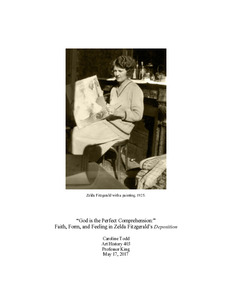"God is the Perfect Comprehension:" Faith, Form, and Feeling in Zelda Fitzgerald's Deposition

View/
Author
Todd, Anna Caroline
Subject
Fitzgerald, Zelda, 1900-1948
Christian art and symbolism
Metadata
Show full item recordDescription
Thesis; [FULL-TEXT FREELY AVAILABLE ONLINE] Anna Caroline Todd is a member of the Class of 2017 of Washington and Lee University. This paper examines Fitzgerald's Deposition from angles biographical as well as formal and iconographical, relating the piece to her personal system of aesthetics as well as her prior work in order to examine the impact of physicality on the work. To begin, I will establish the work's biographical context: Fitzgerald's return to Montgomery, Alabama, after her
institutionalization at Highland Hospital in North Carolina. Here, I will link the work to others she painted at approximately the same time, and provide commentary regarding the intensity of Fitzgerald's religious beliefs as reflected in The Deposition; though the work reflects her knowledge of Biblical texts, her own apocalyptic perspective on the state of the world emerges as its primary inspiration. Then, I will move into an analysis of the image itself, situating its treatment of figural forms within the iconographic tradition of Deposition narratives more generally as well as twentieth century avant-garde movements both European and American. I will conclude this second section with an analysis of Gothic corporeality and a warped notion of Christianity in The Deposition, utilizing the research of cultural critic Jack Morgan as well as calling upon Fitzgerald's earlier works in order to elucidate these ideas. Lastly, I will move toward a formalist interpretation of the painting, drawing from Fitzgerald's own ideas of color and line as argued in "Choreography of an Idea: Resume;" My argument will conclude a with reiteration of the image's didactic purposes as underscored by the iconographic and formal elements within it, both as a spiritual lesson of Christ's sacrifice as well as an artistic examination of the martyrdom Fitzgerald experienced in her own life. Ultimately, The Deposition serves as a product of carefully crafted emotionality, as "Choreography of an Idea: Resume;" illustrates Fitzgerald's own connection between feeling, faith, and form and enlightens the work's purpose as a communication of affect through line. [From Introduction] Caroline Todd